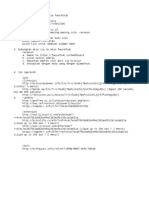
Image Source: The above picture is a brilliant piece of computer art by Adobe Flash Programmer Ben Swift. Go to the following link to see this artwork running, and changing colour in Flash on your computer. (Does not work on iPad). Isometric Cubes can be used to create a variety of 3D shapes, and are a great tool for learning how to visulaise in 3D. Isometric drawing with cubes is often covered as part of Geometry topics in Mathematics.
Isometric Drawing A project in spatial. Evinrude Manual. As a multi-link cube for this purpose. Students then made isometric drawings of their names and found the volume and.
In this lesson we take a quick look at drawing Isometric Cubes, as well as looking at some great online tools for working with 3D using cubes. Isometric Drawing with Cubes Image Copyright 2012 by Passy’s World Making these 3D drawings involves using Isometric Dot Grid Paper, which can easily be obtained from Google Images. If you want some lined grids then click the following link: Once we have the Grid Paper we can draw and colour in cubes like those shown above. This type of drawing is also called “Orthographic Projection”. Isometric Drawing Videos Here is a nice short video which introduces the concept of Isometric Drawing.
This next short video shows how to make Isometric Alphabet Letters. The following video shows how to make an Isometric Cubes Drawing when provided with a Front View, a Side View, and a Top View.

Isometric Drawing Worksheets The links below are to worksheets we found on the Internet for Isometric Drawing. Isometric Cubes Drawing Tool The above online tool is great for drawing Isometric cubes. It even has a 3D Rotatable Viewer which can be opened in a new window once you have placed a few blocks onto the grid. It can be accessed at the following link: Included are full instructions and a lesson on using this Isometric Cubes Drawing Tool at the following link: There is also a ready made lesson about drawing the top view mat for Isometric shapes at the following link: Isometric Cubes Counting Game This is a fun game with a timer to count how many cubes are in each random isometric shape.
Play it at the following link: Building with Cubes Puzzle There are ten puzzles to be solved. On the main entry page, go to “Building with 3 Sides” and then choose the figures to do (there are 10 puzzles). You can move the grey grid square around to help you do views. Once you play around and get used to how build mode works, it is a lot of fun. Important tip for beginners – Build the top view onto the base mat first, and then work upwards from there. Click the link below to go to the web page. Related Items Like Us on Facebook Our Facebook page has many additional items which are not posted to this website.
These include items of mathematical interest, funny math pictures and cartoons, as well as occassional glimpses into the personal life of “Passy”. Windows Millenium Iso Bootable on this page. Check it out at the following link: While you are there, LIKE the page so you can receive our FB updates to your Facebook News Feed. Help Passy’s World Grow Each day Passy’s World provides hundreds of people with mathematics lessons free of charge. Help us to maintain this free service and keep it growing. Donate any amount from $2 upwards through PayPal by clicking the PayPal image below. PayPal does accept Credit Cards, but you will have to supply an email address and password so that PayPal can create a PayPal account for you to process the transaction through.
There will be no processing fee charged to you by this action, as PayPal deducts a fee from your donation before it reaches Passy’s World. If you enjoyed this lesson, why not get a free subscription to our website.
You can then receive notifications of new lessons directly to your email address. Go to the subscribe area on the right hand sidebar, fill in your email address and then click the “Subscribe” button.
To find out exactly how free subscription works, click the following link: If you would like to submit an idea for an article, or be a guest writer on our Website, then please email us at the hotmail address shown in the right hand side bar of this page. Feel free to link to any of our Lessons, share them on social networking sites, or use them on Learning Management Systems in Schools. Enjoy, Passy.
When you first look at the front view, the meaning of the hidden lines are not yet clear, and the curvature of the front cannot be understood. Through mentally combining the front and top views, some of the hidden lines can now be understood, and the curvature of the front seen. Only after combining all 3 views can the object be correctly visualized in 3D. Use of models to aid visualization: If you have trouble visualizing the 3D object from the 2D projections, get some modeling clay or play dough, and make the object.